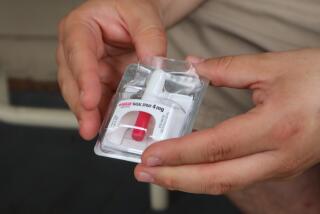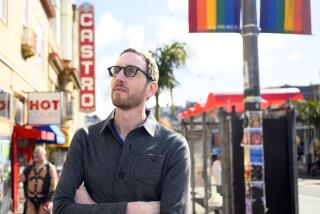Emotional Plea of Gay Group Sparked the AIDS Drug Bill
In the early evening of May 18, state Atty. Gen. John Van de Kamp sat down in an overstuffed chair in a West Hollywood living room for a discussion with a group of gay community leaders. The subject was AIDS, and the talk was from the heart, not from statistics.
It was a meeting, Van de Kamp would later say, that proved a turning point in his own commitment to AIDS issues, specifically to increased testing of experimental AIDS drugs. It eventually would lead to the drafting of AB 1952, the AIDS drug-testing bill that Gov. George Deukmejian signed into law Monday.
‘It Goes On and On’
That May evening became emotional early on. The gay leaders told the attorney general about their friends, the dead and the dying. David Mixner, a government affairs consultant who hosted the gathering, described the block where he lives: “John used to live there. He’s dead now. And the guy next door, too. So and so down the street has AIDS now and is very, very sick. It goes on and on.”
They talked about attending friends’ funerals, sometimes as many as three in one day. “This is what’s going on from a personal standpoint. The funerals we’ve gone to, so many it’s like a Holocaust,” said gay activist Jean O’Leary. “A whole generation of men dying and going to die. And nobody is caring. Can’t you help us do something?”
They spoke from a personal point of view. “I have been involved with this issue organizationally and emotionally for a long time,” said lawyer Peter Scott, who was diagnosed Aug. 1, 1986, with acquired immune deficiency syndrome. “But when you’re on the other side of the wall, it’s different. You really start thinking about your own survival. AIDS changes your life, how you think from day to day. It brings into play every emotion, every fear anybody has ever been subjected to.”
Months later, the 2 1/2-hour session remained indelibly etched in Van de Kamp’s memory. “It was,” he said, “a cry of frustration . . . one of the gloomiest evenings I’ve spent in a long time.”
The gay leaders were all members of a loosely formed organization called the Book Study Group, created earlier this year to quietly lobby state and national lawmakers on legislation to address the AIDS epidemic. The members, many of whom had known one another for years and worked together on gay rights and AIDS issues, chose the deliberately innocuous name to keep the effort low-key.
“We decided it was most important to educate him,” O’Leary said of the group’s session with Van de Kamp. “But it became very emotional and very personal. We’ve done this before, talked with a lot of high government officials, but we never got this response before.”
Many of the group members were vocally frustrated by what they saw as U.S. Food and Drug Administration foot-dragging in approval of drugs for experimental testing in AIDS patients, a charge FDA officials have steadfastly denied. O’Leary’s own group, the National Gay Rights Advocates, had filed suit against the FDA and National Institutes of Health in an attempt to force faster approval of AIDS drugs for national testing among volunteers.
Question and Response
“We’re truly desperate,” clinical psychologist Rob Eichberg told the attorney general. “So many people diagnosed with AIDS and ARC (AIDS-related complex) are willing to be guinea pigs for these drugs. There just aren’t enough (drugs) available for testing, so they’re going to Mexico to get them or making home remedies.”
What, wondered the group’s six men and three women, might be done in California to speed up trials of new drugs and to involve more AIDS patients in the testing process? Could the state start a testing program of its own?
Van de Kamp recalls being deeply moved. He began working on a solution to the testing problem the very next day, he said, insisting to his staff that a plan to test AIDS drugs in the state be given priority over any other issue.
“The one thing I came away with was a resolve to test (AIDS drugs) independently in California,” he said, explaining that he wasn’t sure the procedure could legally be done. But “I thought that it might make some sense, given the size of the problem in California. The bottom-line conclusion is a human one.”
The legislation, proposed by Democrat Van de Kamp and signed by Republican Deukmejian, enables California to begin its own program of testing experimental AIDS drugs on volunteer patients without waiting for federal approval. It is the first state to embark on such a program for AIDS drugs.
Under the bill, drugs that are manufactured in California can be authorized by the state for clinical trials here. The drugs that prove effective against the AIDS virus then can be licensed for sale in California, also without FDA approval. (In signing the bill, Deukmejian cautioned that he intends to leave the latter function up to the FDA.)
“The review and approval of drugs is a national issue and it is unrealistic to expect California to duplicate their work or resources,” Deukmejian said.
Longtime Activist
“We should not . . . view this legislation as a substitute for FDA approval of drugs in the treatment of AIDS, or as a precedent for drugs in the treatment of any other disease.”
“I’ve been around politics a long time and I have never seen anything (happen) so fast,” Scott, a longtime political activist and gay rights advocate, said of the testing bill. “He (Van de Kamp) moved the very next day, and that was incredible, especially with an issue as explosive as AIDS.”
But Van de Kamp, whom some expect to run for governor in 1990, said he did not see testing of AIDS drugs in California as a political issue. “It should be out of politics,” he said. “It’s a medical issue. I don’t think this proposal has a particular political purpose. It is the arrival of common sense, like a light that goes on.”
From the beginning, Van de Kamp said, his proposal was well received by politicians and state health officials. The testing program will be conducted under the auspices of the state Department of Health Services.
“This is not going to be a cheap or dirty testing operation,” Van de Kamp said. “There will be strict procedures, record keeping, using the protocols the FDA uses. We’ve tried to do it the right way.
“This whole business is a test of a larger proposition--what government should and can do about AIDS. It should play an enormously positive role in dealing with it. . . . We cannot stand back and let others do it. It costs money and has human costs. But the human costs are the most important.”
Bipartisan Support
Since he considered it a “human issue,” Van de Kamp said he had expected the bill to pass with wide bipartisan support. Indeed, the bill was authored by Assemblyman William Filante (R-Greenbrae), the Assembly’s only physician. Sponsored in the Senate by Sen. John Doolittle (R-Rocklin), it unanimously passed the Senate on Sept. 10. The next day, the Assembly approved it unanimously, too.
Van de Kamp said he couldn’t imagine anyone being opposed to AIDS drug testing “unless it was someone truly deviant with respect to their compassion toward other human beings. . . . I can’t imagine any reasonable person engaging in a belief that people with AIDS should not have a cure.”
More to Read
Sign up for Essential California
The most important California stories and recommendations in your inbox every morning.
You may occasionally receive promotional content from the Los Angeles Times.









